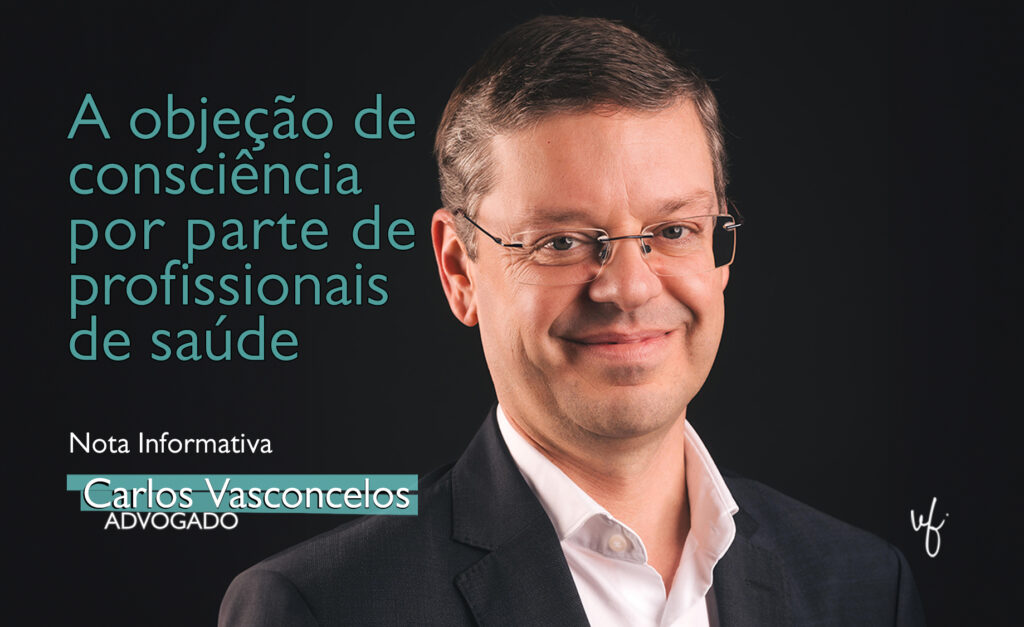Conscientious Objection by Healthcare Professionals

April 7, 2025
Legal Brief by Carlos Vasconcelos
The issue of healthcare professionals invoking conscientious objection has become a prominent topic in public debate. This has especially been the case regarding voluntary termination of pregnancy. The discussion is expected to intensify further, particularly in light of medically assisted death.
In this context, the National Council of Ethics for the Life Sciences (CNECV) decided, on its own initiative, on 17 January 2025, to issue an opinion on the ethical aspects of the exercise of the right to conscientious objection by healthcare professionals – Opinion 133/CNECV/2025.
In said Opinion, the CNECV:
- recalls that conscientious objection is a form of refusal to perform an action, carry out a professional function or role, or assume a legal responsibility, motivated by personal values, recognised as a right and an ethical/moral prerogative supported and reinforced by the law, and constitutionally guaranteed under the protections of individual freedom (Constitution of the Portuguese Republic, Article 41(6));
- emphasises that, as a right, conscientious objection may sometimes come into conflict with other rights, thereby raising ethical and legal issues;
- argues that conscientious objection must not be confused with occasional refusals to intervene by professionals, such as technical objection, legal objection or social objection; nor with objections motivated by emotional grounds, or institutional objection – concepts that the CNECV addresses and defines;
- issues an opinion in which it argues, among other points, that:
- the right to conscientious objection, as an expression of respect for the dignity of all individuals – including healthcare professionals – must be protected, as it reflects the diversity of people and their values, which is a fundamental good to be promoted;
- conscientious objection may only be invoked by professionals when the intervention(s) in question offend or violate their fundamental principles and values, and a means must be found to ensure that its exercise does not affect the individual and/or collective rights of citizens;
- prior and accurate knowledge of the number of objectors is essential, and thus it defends the need for prior notification of objector status, with explicit specification of the intervention(s) in relation to which each professional invokes conscientious objection, to the healthcare institution(s) where the professional practises. This prior notification should be a mandatory condition for a refusal to intervene based on conscientious objection, so as to allow for proper organisation of services and ensure access to interventions;
- prior notification of objector status must also be mandatory to the relevant professional orders;
- the prior declaration of objector status must be disclosed only to those with legitimate need to know, in order to allow appropriate organisation of services;
- conscientious objection must be conditioned upon the guarantee that the objected act(s) will still be carried out, requiring objecting professionals to have up-to-date knowledge of the protocols in force in the institution(s) where they practise, so as to appropriately refer patients; and requiring healthcare institutions to maintain detailed and up-to-date information on objecting professionals, and to establish, in coordination with the authorities, feasible and efficient processes to refer patients when needed, ensuring access to care;
- healthcare institutions and professional orders must provide strong training on the right to conscientious objection, aligned with ethical, deontological, and legal values, as well as on the associated duties and responsibilities;
- as a last resort to ensure access to interventions, the healthcare institution must be allowed to hire professionals who declare themselves not to be objectors for the required procedure;
- the political and legislative powers must develop uniform regulation on conscientious objection that ensures both respect for its invocation and the protection of citizens’ rights.


